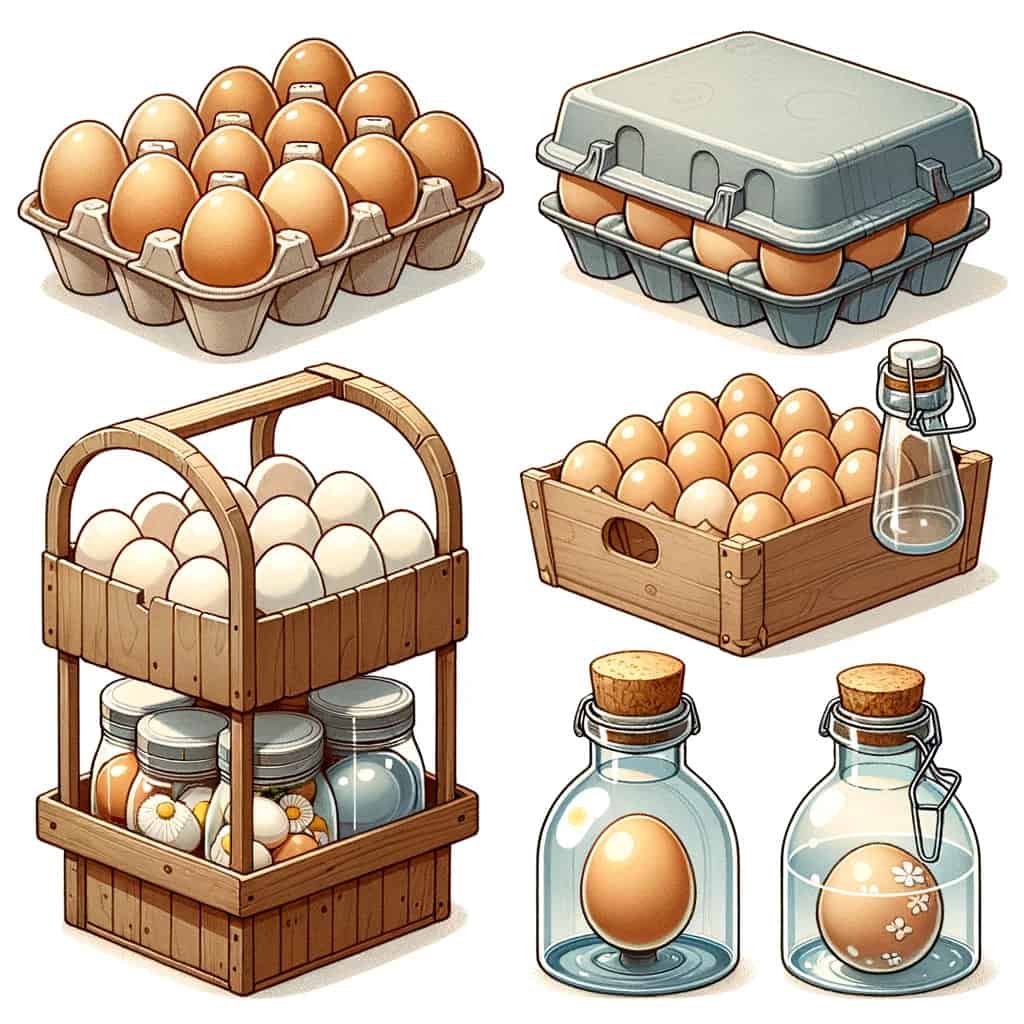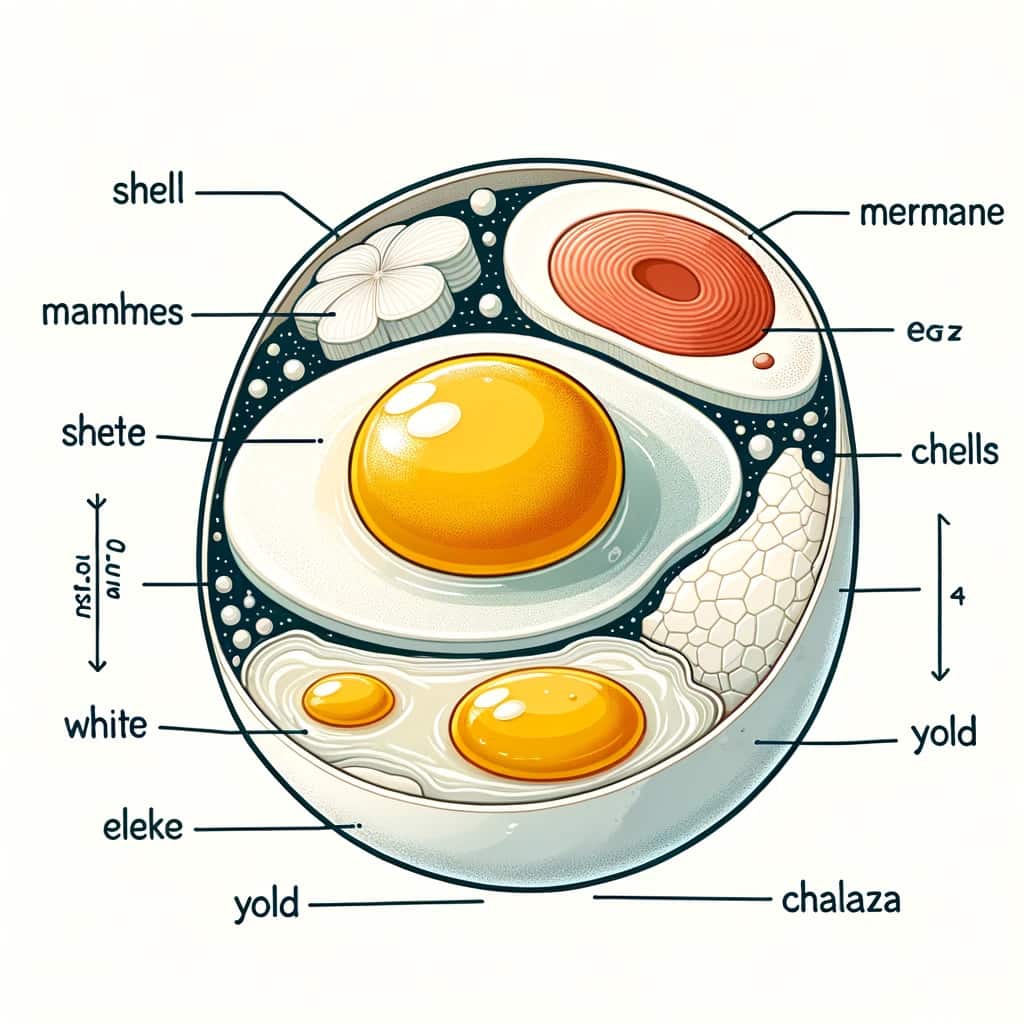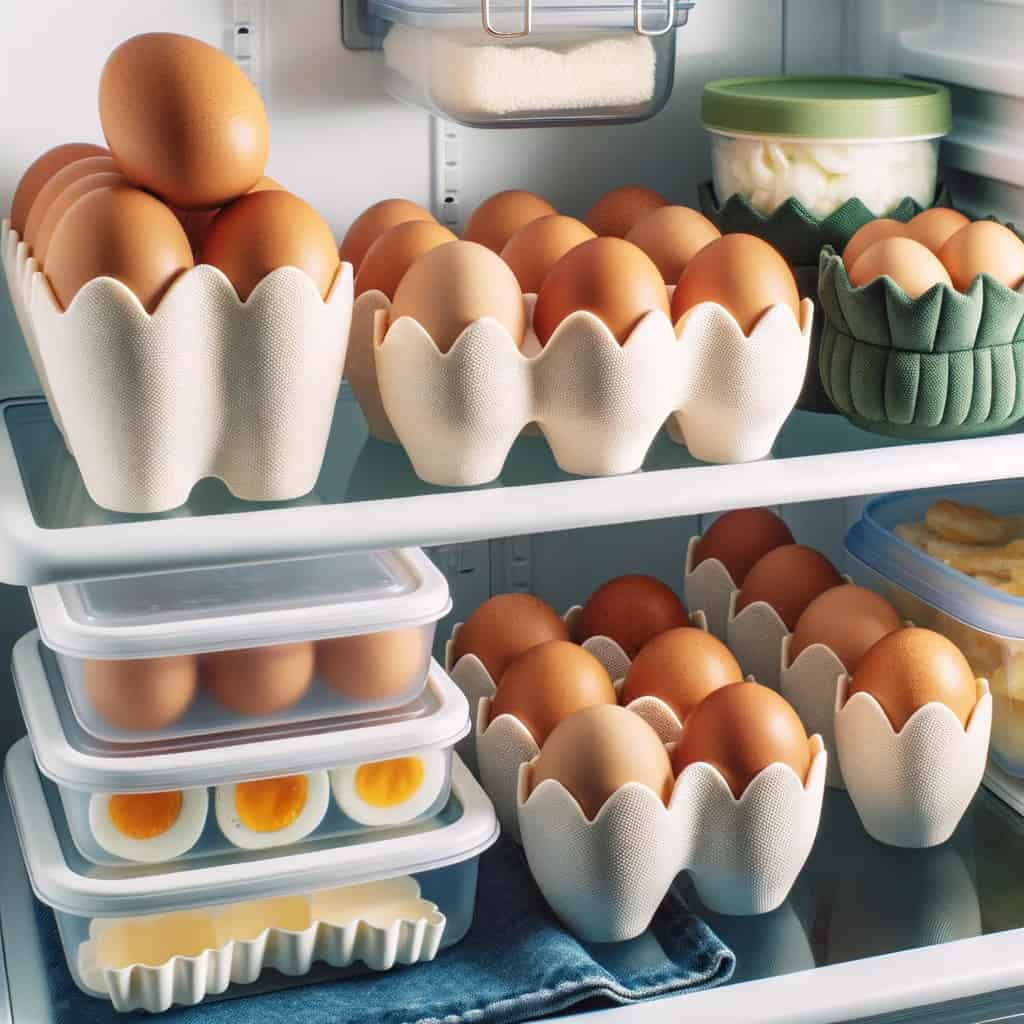Eggs, as simple as they seem, are a staple in almost every kitchen across the globe. Their versatility in culinary applications, from fluffy omelets to decadent desserts, makes them an indispensable ingredient.
However, how many of us have stopped to think about the best way to store them? I mean, beyond just popping them into that familiar cardboard carton and shoving them somewhere in the fridge.
Importance of Proper Egg Storage:
- Freshness and Flavor: An egg stored correctly maintains its freshness longer, ensuring that the yolk remains golden and the whites stay clear. Fresh eggs taste better, cook better, and provide the best nutritional value.
- Safety First: Eggs are perishable. Storing them improperly can lead to bacterial growth, especially salmonella. This bacteria can cause food poisoning, which is definitely not something anyone wants after a delightful breakfast.
- Economic Sense: With the rising cost of groceries, no one wants to t ow away food. Proper storage ensures your eggs stay edible for longer, saving you money in the long run.

Also see: The Tramontina All in One Plus Pan Review
Why Ditch the Carton?
It might sound odd initially. Why would anyone be without an egg carton? But there are many reasons one might find themselves in such a situation:
- Environmental Concerns: Cardboard cartons, although recyclable, still contribute to waste. Those seeking a more sustainable lifestyle might look for alternatives.
- Bulk Buying: If you own chickens or buy eggs in bulk, you often get them in flats or containers that aren’t suitable for long-term storage.
- Damaged Cartons: Accidentally spilled some juice on your egg carton? Wet or damaged cartons can be a breeding ground for mold and bacteria.
- Travel and Camping: Planning an outdoor adventure or moving to a new place? You’ll need a more secure and portable solution than a flimsy cardboard carton.
Whether you're an avid cook or someone who enjoys a simple boiled egg now and then, it's clear that how you store your eggs can make a world of difference. So, next time you're at the grocery store or collecting eggs from your backyard coop, give a thought to where and how you'll store them. Your taste buds (and wallet) will thank you!< class="wp-block-separator has-alpha-channel-opacity"/>
Understanding the Basics: The Egg Story
Eggs are not just breakfast heroes or baking essentials; they are complex structures with multiple layers, each serving a purpose. To truly master the art of storing them, we need to dive into the basics.

Egg Anatomy and Freshness:
When you crack open an egg, what do you see? Most would say the yolk and the whites. But there’s so much more to it.
- Shell: The egg’s first line of defense. It’s semi-permeable, allowing the egg to breathe while protecting it from bacteria and dust.
- Membranes: There are two – inner and outer. They guard against bacterial invasion. As an egg ages, these membranes weaken, making the egg less fresh.
- White (Albumen): This clear, jelly-like substance has proteins and water. A thicker white indicates a fresher egg.
- Yolk: The nutrient-rich center. A fresh egg has a round and firm yolk, while an older one tends to flatten and spread.
- Chalaza: Ever noticed those white, stringy bits? They anchor the yolk in the center of the white, keeping it in place.
A fresher egg not only tastes better but also behaves differently in recipes. For instance, fresh eggs have tighter whites, making them perfect for poaching. But as they age, the whites loosen, which is ideal for hard-boiling since they’re easier to peel.
The Refrigeration Debate:
Ah, the age-old question: To refrigerate or not to refrigerate? Let’s break it down.
- Refrigeration Pros:
- Safety: Cold temperatures slow down the growth of harmful bacteria.
- Longevity: Eggs last longer in the fridge, extending their shelf life.
- Refrigeration Cons:
- Flavor Impact: Some argue that cold eggs might absorb unwanted fridge odors.
- Temperature Consistency: Using cold eggs in certain recipes, like baked goods, can affect the outcome.
- Room Temperature Pros:
- Consistent Flavor: No risk of fridge odors.
- Recipe Ready: Eggs at room temperature mix better in recipes.
- Room Temperature Cons:
- Shorter Shelf Life: They won’t last as long as their refrigerated counterparts.
- Safety Concerns: Warmer temperatures can encourage bacterial growth.
In many countries, eggs aren’t refrigerated due to differences in egg processing and washing practices. But in places like the US, washing removes a protective layer from the eggshell, making refrigeration necessary to prevent bacterial contamination.
With a clear understanding of egg anatomy and the factors that contribute to its freshness, we're better equipped to make informed decisions. And when it comes to the big refrigeration debate, it all boils down to personal preference and safety guidelines in your region. Whether you're team 'fridge' or team 'counter', one thing's for sure: a well-stored egg is a tasty egg!< class="wp-block-separator has-alpha-channel-opacity"/>
Diverse Ways to Store Eggs: From Fridge to Counter
Eggs might be universal, but the ways to store them are as diverse as the dishes they help create. Whether you’re looking for traditional methods or exploring DIY solutions, there’s an egg storage solution for everyone.

Also see: GreenPan Venice Pro Review
In the Fridge:
Storing eggs in the fridge is a method embraced by many, especially in countries where eggs are washed, removing their natural protective layer. But even within the confines of the cold, there are multiple ways to ensure your eggs remain fresh:
- Containers Galore:
- Plastic Containers: These transparent containers let you check on your eggs without opening the lid. Some even come with built-in holders to keep each egg secure.
- Silicone Egg Holders: Flexible and easy to clean, these holders adapt to the size of your eggs, ensuring they don’t jostle around.
- Proper Placement – Point Up or Down?:
- Point Down: Some argue that this keeps the yolk centered and the air cell at the top, maintaining freshness.
- Point Up: Others believe this minimizes the risk of bacteria entering the egg t ough the larger end.
- DIY Solutions:
- Egg Storage Bins: Using clear storage bins with dividers can be a cost-effective solution.
- Fabric Egg Cozies: For those who enjoy crafting, fabric cozies can be a fun project. They not only store but also insulate the eggs.
On the Counter:
For those who prefer to keep their eggs at room temperature, or for those who live in regions where unwashed eggs are the norm, here are some solutions:

- Wooden Egg Holder Plans: A rustic and stylish way to display your eggs. These holders can be bought or crafted at home, providing slots for each egg.
- Makeshift Solutions:
- Bowls: Simply placing eggs in a deep bowl can be effective. Just ensure they aren’t stacked too high.
- Baskets: Wicker or wire, baskets allow for airflow, keeping your eggs dry.
- Preservation Techniques:
- Water Glassing: A method where eggs are submerged in a solution of water and sodium silicate. This seals the pores, preserving them for up to a year!
- Lime Preservation: Eggs are stored in a solution of water and hydrated lime, extending their shelf life significantly.
- Shelf Life Outside the Fridge:
- Unwashed, farm-fresh eggs can last for about two weeks at room temperature.
- Washed eggs, however, have a shorter lifespan and should be consumed within a week.
Storing eggs might seem like a mundane task, but as we've seen, there's an art and science to it. Whether you're a fridge fanatic or a countertop connoisseur, understanding these methods ensures your eggs remain fresh, tasty, and ready for your next culinary adventure!< class="wp-block-separator has-alpha-channel-opacity"/>
Camping with Eggs: Your Guide to Outdoor Omelettes
Ah, the great outdoors! Fresh air, beautiful landscapes, and… eggs? Yes, eggs! Just because you’re camping doesn’t mean you have to skip out on a hearty breakfast. But taking eggs on a camping trip requires some preparation and a few hacks up your sleeve.

Prepping Eggs for the Great Outdoors:
Before you even pack those eggs, you need to prep them. This ensures they remain fresh and ready to be cooked on your campfire or portable stove.
- Check for Freshness: Do the float test. Fill a bowl with water and place your egg inside. Fresh eggs will sink, while older ones will float. Only take the ones that sink.
- Clean Them: If you’ve sourced farm-fresh eggs, give them a gentle wipe to remove any dirt or feathers. Remember, unwashed eggs have a protective layer that helps them last longer.
Packing and Transport Hacks:
Eggs are fragile, and the last thing you want is to open your backpack and find a yolky mess. Here are some strategies to transport them safely:
- Eggs in a Bottle: One of the most popular camping hacks. Crack your eggs into a bottle, ensuring there’s no shell. This way, you have pre-cracked eggs ready for scrambling or making pancakes.
- Egg Carton Reinforcement: If you prefer whole eggs, reinforce your carton with bubble wrap or a soft cloth to provide added cushioning.
- Plastic Egg Containers: These are specially designed for camping. They’re sturdy and protect your eggs from getting crushed.
- Pre-Cracked Strategies: If you’re planning dishes that need only egg whites or yolks, separate them at home. Store whites and yolks in different containers to save space and avoid wastage.

Keeping Them Fresh While Camping:
Once you’re at your campsite, the challenge is to keep those eggs fresh, especially if you’re on a multi-day adventure.
- Cool and Dry: Store your eggs in the coolest part of your campsite, preferably shaded. If you’re near a stream, consider placing them in a waterproof bag and submerging them in the cool water.
- Egg Rotation: If you’ve brought whole eggs, rotate them once a day. This keeps the yolk centered and prevents the air cell from enlarging, which can make the egg go bad.
- Consume Quickly: Try to consume your eggs in the first couple of days of your trip, especially if you don’t have refrigeration methods available.
Camping with eggs might seem like a daunting task, but with the right prep and hacks, you can enjoy delicious meals even in the heart of nature. So, on your next camping trip, don't forget to pack those eggs and savor the taste of home, no matter where you pitch your tent!< class="wp-block-separator has-alpha-channel-opacity"/>
Egg Carton Alternatives: Think Outside the Carton
Who said eggs only belong in cartons? While traditional egg cartons are undeniably handy, there are countless innovative and eco-friendly alternatives that can house your eggs just as effectively. Whether you’re feeling crafty or just want to reduce waste, there’s an egg storage solution waiting for you.

Creative DIY Substitutes for Traditional Cartons:
- Fabric Pouches: Craft some quilted fabric pouches, giving each egg its snug spot. They’re reusable, washable, and perfect for those who love a touch of handmade charm.
- Crochet or Knit Egg Holders: For the yarn enthusiasts, whip up some cute crochet or knit pockets to cradle each egg. Not only are they functional, but they also make for adorable kitchen decor.
- Muffin Tins: Have some extra muffin tins lying around? They can double up as egg holders! Each cavity is just the right size for an egg.
Utilizing Containers Like Plastic and Wood:
- Plastic Bins with Dividers: Grab a clear plastic bin, add some dividers, and voilà, you have a DIY egg container. It’s stackable and perfect for those who buy eggs in bulk.
- Wooden Egg Crates: Channel a rustic vibe with wooden egg crates. They’re durable, stylish, and can be painted or decorated to match your kitchen’s aesthetic.
Repurposing Cartons for Crafts:
Egg cartons are more than just storage containers. Their unique shape and structure make them perfect for a plethora of crafts:

- Egg Carton Flowers: With some paint and a bit of creativity, transform your carton into beautiful blossoms. Arrange them in a vase for an everlasting bouquet.
- Caterpillars: Kids will love this! Paint the carton, add some googly eyes and pipe cleaner antennae, and you’ve got a cute little critter.
- Seed Starters: Poke a hole at the bottom for drainage, fill with soil, and plant a seed. It’s an eco-friendly way to kickstart your gardening journey.
- Organizers: Separate your jewelry, beads, or small craft items using the compartments of an egg carton.
In essence, egg cartons, whether traditional or DIY, serve as more than just protective shells for eggs. They're a canvas for creativity, a tool for sustainability, and a testament to human ingenuity. So next time you're about to toss that carton away, think twice. It might just be the start of your next craft project or storage solution!< class="wp-block-separator has-alpha-channel-opacity"/>
Decoding Egg Carton Labels: Cracking the Code
Egg carton labels can seem like a cryptic puzzle, filled with dates, codes, and terms that might leave you scratching your head. But fear not! By the end of this section, you’ll be an expert in egg carton linguistics, ready to make informed choices on your next grocery run.
Understanding the Date on the Carton:
Every egg carton comes stamped with a date, but what does it really mean?

- Sell-by Date: This is a guideline for retailers. It tells them until when the eggs should remain on the shelves. However, eggs can be consumed a few weeks past this date, provided they’ve been stored correctly.
- Use-by or Expiration Date: This is the last date recommended for the best flavor and quality of the eggs. After this date, while the eggs might still be safe to eat, their quality might not be at its peak.
- Pack Date: This is the day the eggs were packed into the carton. It’s often shown as a t ee-digit code, representing the day of the year (Julian date).
The Julian Date, Sell-by, and Expiration Info:
- Julian Date: This is a continuous count of days since the beginning of the calendar year. For instance, January 1 is 001, and December 31 is 365 (or 366 in a leap year). It’s a quick way to determine the egg’s freshness.
- Difference between Sell-by and Expiration: While the sell-by date is more for retailers, the expiration or use-by date is for consumers. Eggs can be eaten a few days to weeks past their sell-by date, but always check for signs of spoilage.
Egg Packaging Designs and Dimensions:
Egg cartons come in various shapes, sizes, and designs, tailored to hold different quantities of eggs and appeal to consumers.

- Standard Carton Sizes: There are cartons designed to hold 6, 12, 18, 24, or even 30 eggs.
- Material Varieties: From classic molded pulp and styrofoam to clear plastic, the material can vary based on brand and eco-friendliness.
- Dimensions: The size of the carton can differ based on the number of eggs it holds, the size of the eggs (small, medium, large, extra-large), and the design intricacies.
Understanding egg carton labels is essential. It ensures you get the freshest eggs, maximizes their shelf life, and helps you make informed decisions at the store. So, the next time you pick up a carton of eggs, give that label a glance. You're now equipped with all the knowledge to crack its code!< class="wp-block-separator has-alpha-channel-opacity"/>
Frequently Asked Questions (FAQs): Egg-ceptional Queries Answered
Navigating the world of eggs can stir up a flurry of questions. But don’t scramble just yet! We’ve cracked open answers to some of the most egg-sistential queries out there.

- How long are eggs good after the Julian date?
- Eggs are typically fresh for about 4-5 weeks past the Julian date. However, always conduct a float test or sniff test for signs of spoilage before consumption.
- What’s the best way to take eggs camping?
- Consider pre-cracking eggs and storing them in a sealed bottle. This eliminates the risk of breakage and makes cooking a breeze. Alternatively, use reinforced or padded cartons for added protection.
- Why don’t some countries refrigerate eggs?
- Many European countries don’t wash eggs to preserve their natural protective layer, which prevents bacterial contamination. This allows them to store eggs at room temperature. However, always check local guidelines on egg storage.
- How do you store fresh eggs in a carton?
- Store them with the pointed end facing down. This helps keep the yolk centered and extends freshness. Ensure the carton is in the coldest part of the fridge, not the door.
- What does the date on an egg carton mean?
- It can be a sell-by, use-by, or pack date. Sell-by is a guideline for retailers, use-by indicates peak quality, and pack date (often in Julian code) shows when the eggs were packed.
- How to remove eggs stuck in cartons?
- Gently run a spoon or butter knife under the egg to release it. If the egg is wet or sticky, let it dry first to reduce the risk of breakage
Conclusion: Wrapping Up the Egg-stravaganza
Cracking the code of egg storage isn’t just about ensuring breakfast is fresh; it’s about respecting the produce, maximizing its shelf life, and embracing sustainability. As we’ve journeyed t ough the intricate world of eggs, we’ve unearthed the significance of proper storage, both in our cozy kitchens and the great outdoors.
Remember, every egg is a delicate bundle of nutrition and flavor, and how you store it can make all the difference. Whether it’s in a chic wooden holder on your countertop, a DIY fabric pouch, or even a trusty carton in the fridge, each method has its merits.
But don’t just take our word for it. Venture out, experiment, and find what works best for you. Maybe it’s time to craft your own egg holder or perhaps explore the ancient art of water glassing? The egg-citing world of egg storage is vast, and every technique is an adventure waiting to unfold.
So, the next time you bring home a tray of eggs, give them the care they deserve. And in the process, you might just discover a newfound appreciation for these humble kitchen staples. After all, the best way to enjoy an egg is to ensure it’s stored right. Happy egg-storing, folks!


